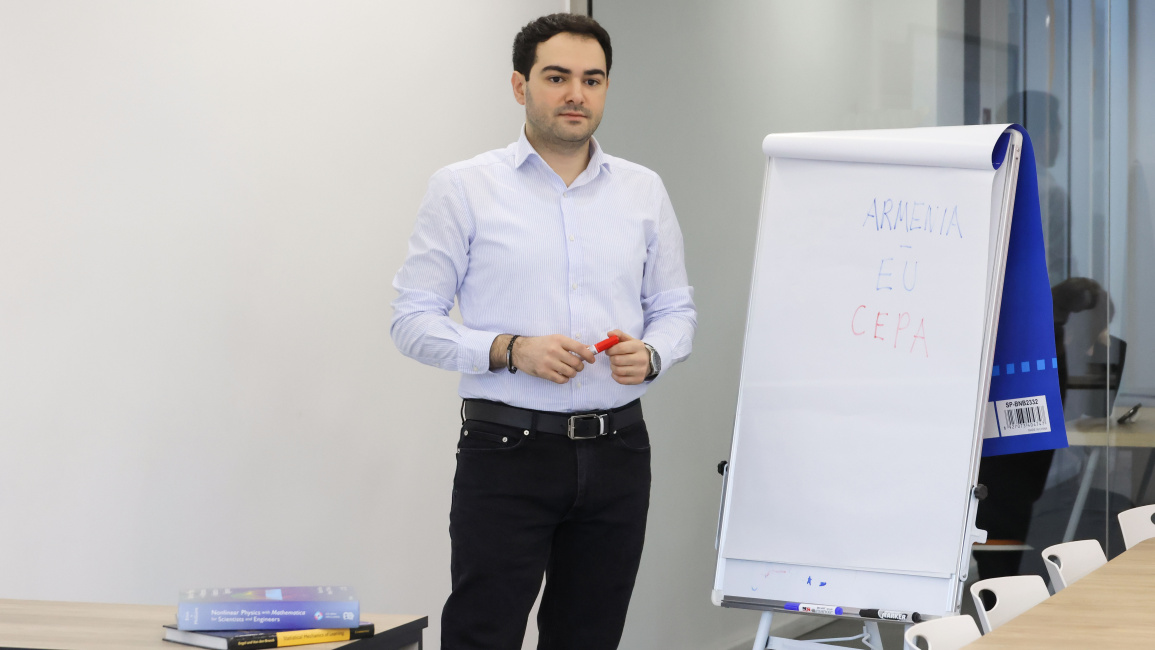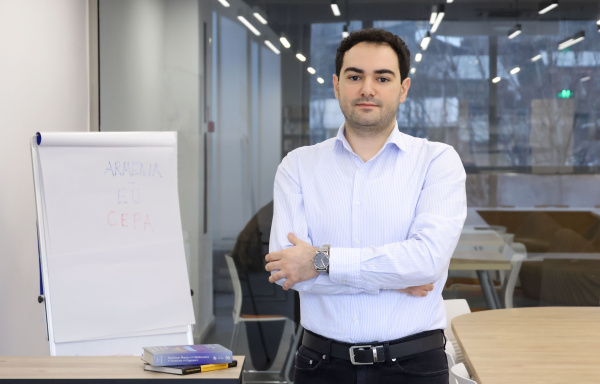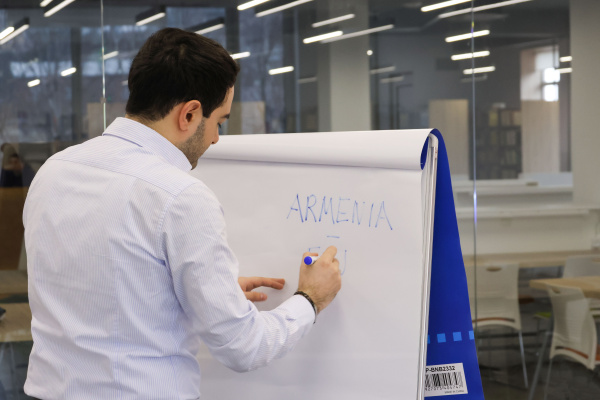February 06, 2025 | 14:11
Research
Lifelong learning
Student
Mastering western research methods and prospects for collaboration: YSU PhD student on University of Jena
As part of interuniversity cooperation, Alen Sargsyan, a PhD student at YSU Faculty of International Relations, conducted research for one month at Friedrich Schiller University Jena (Germany). He emphasizes that both YSU and the University of Jena actively promote interdisciplinary collaboration, enabling researchers to integrate methodologies from various fields and achieve innovative outcomes.

- Alen, what unique features distinguish the University of Jena? Does the university's approach to organizing education help researchers in achieving innovative outcomes?
- First, as an interesting fact, I should mention that Hakob Manandyan, the second rector of Yerevan State University and a renowned historian, studied at the University of Jena, as did other notable Armenian scholars, including Manuk Abeghyan. Additionally, Karl Marx defended his doctoral dissertation in philosophy there. Poet Friedrich Schiller and philosopher Hegel also taught at that university.
The University of Jena has numerous distinctive features. As I already mentioned, the Friedrich Schiller University Jena is one of Germany’s leading historical and academic centers. It leads in various research fields, ranging from biology and medicine to political science and history. In addition to its faculties and chairs, the university also houses specialized institutes.
Furthermore, the university actively promotes an interdisciplinary approach, fostering collaboration between different scientific disciplines. This enables researchers to integrate methods from various fields, leading to innovative outcomes. In terms of opportunities, it is also worth highlighting that the university boasts modern, well-developed infrastructure, including state-of-the-art research centers and other essential facilities.
- At the University of Jena, your research focused on Armenia-EU relations. What conclusions have you reached, and what prospects do you see for Armenia-EU relations?

- At the Friedrich Schiller University Jena, I worked on two research articles. I have fully completed a research paper titled "The Establishment and Further Development of Armenia-EU Relations". Additionally, I conducted research for another article on the topic "The European Union and Euro-Integration Processes in the South Caucasus Region".
As a conclusion to my studies, I would note that Armenia-EU relations have undergone a rich path of establishment and development, recently marked by the signing and implementation of the Comprehensive and Enhanced Partnership Agreement (CEPA). This agreement opens new prospects for Armenia-EU relations. Beyond serving as a legal and contractual foundation for relations, CEPA envisions cooperation not only in political and economic spheres but also across a wide range of areas, including justice, education, science, culture, and more. Additionally, there are positive prospects regarding the visa liberalization process, with dialogue on this matter officially launched in July 2024.
- What literature did you use in your research? What opportunities does the University of Jena’s library offer?
- The University of Jena’s library, which is almost entirely digitized, offers a wealth of research literature and resources that go beyond just available materials. It also provides remote access to almost all major academic journals and articles worldwide, which is the best way for young researchers like myself to access modern and hard-to-reach sources.
Given the relevance of my research topic, the publications I focused on were mostly from the last decade.
- As an invited PhD student from Yerevan State University, what meetings have you had abroad, and are there any opportunities for collaboration?
- During my visit, I regularly met with Professor Olaf Leisse, Head of the Chair of European Studies at the Institute of Political Science, the University of Jena, who had invited me. Together, we had engaging discussions on my dissertation topic, as well as on research methodology and current political science issues.
In addition, I had meetings with both the professors of the Institute of Political Science at the University of Jena and with the university’s students and candidates. I also had a separate meeting with the head of the Institute of Caucasian Studies at the University of Jena, and we agreed to collaborate in the future on the exchange of expertise and joint research projects.
- Regarding the opportunity provided by Yerevan State University to conduct research abroad, could you please outline the steps you took to make use of this opportunity and what new knowledge you gained? Was that one month conducive to further expanding your worldview?

- I learned about the opportunity for a research visit through informational emails from the Doctoral Education Center at Yerevan State University. The program immediately piqued my interest, as I had heard of the University of Jena. After receiving an invitation from Professor Olaf Leisse, Head of the Chair of European Studies at the Institute of Political Science, the University of Jena, I applied to participate. Following the interview process, I was selected as a participant and left for Jena.
Conducting research at one of Germany’s leading universities was a unique experience for me, especially considering the cultural features of the university and its high-quality academic environment. Although it is one of Germany’s oldest universities, it is equipped with modern technology and contemporary research approaches.
I can say that during my research visit, I improved my communication skills and learned the German or Western approaches to conducting research. In this regard, spending one month conducting research at a European university was undoubtedly beneficial in expanding my worldview and acquiring new knowledge and skills.
- Alongside your research work, you are also working. Which field have you chosen, and how closely is it related to your area of expertise? Please also share your plans for the near future.
- As a graduate of the bachelor's and master's programs at YSU Faculty of International, and currently a PhD student, I apply my professional knowledge in the field of research. Since European studies are within the scope of my academic interests, I am currently focusing on the study of Armenia-EU relations and cooperation.
I am also working in a different field as a lieutenant in the customs service, specifically as a senior customs officer. Although at first glance, the customs sector and international relations may seem unrelated, my knowledge of international relations helps me deal with matters related to international trade, interstate agreements, international relations in the customs sector, and global approaches.
In the near future, I plan to publish the results of my research, including my research articles, and further deepen my collaboration with leading European universities and scholars.

